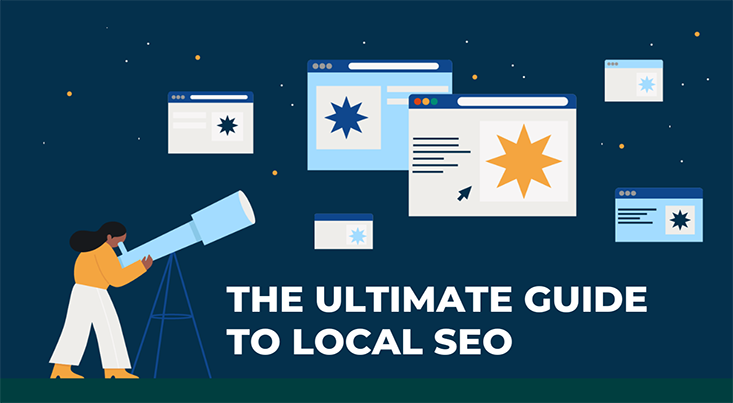The Ultimate Guide to Local SEO: Outranking Your Competition
Local SEO is a crucial aspect of digital marketing for any business with a physical location. It helps potential customers find your business when searching for products or services in your area. With the increasing importance of online search, having a strong local SEO strategy has become essential for any business looking to attract and retain customers.
Understanding the Importance of Local SEO
Local SEO is a specific type of SEO that focuses on optimizing a website for search engines for keywords related to a particular geographic location. For example, if you own a bakery in New York City, your local SEO strategy would focus on optimizing your website for keywords such as “bakery in NYC” or “best bakery in New York.”
The reason local SEO is so important is because it helps businesses attract customers who are actively searching for products or services in their area. By optimizing your website for local search, you can increase your visibility and reach a highly targeted audience of potential customers.
Moreover, local SEO provides a level of credibility and legitimacy to your business. When a potential customer performs a local search, the search engines show a list of businesses that meet the searcher’s criteria, along with their address, phone number, and other important information. This information gives the searcher a sense of the business’s location, operating hours, and overall reliability.
One of the main components of a successful local SEO strategy is having an up-to-date and accurate Google My Business (GMB) listing. Your GMB listing is the information that appears on the right side of the search engine results page when a local search is performed. It includes your business name, address, phone number, website, and reviews, among other information. It is crucial to keep your GMB listing updated and accurate, as this information is used by search engines to determine the relevance and credibility of your business.
Another important aspect of local SEO is having relevant and high-quality backlinks. Backlinks are links from other websites that point to your website. The more high-quality backlinks you have, the more authoritative and credible your website will appear to search engines. This is why it is important to have a robust link building strategy that focuses on acquiring backlinks from local websites, such as local news outlets, business directories, and community organizations.
In addition to GMB listings and backlinks, keyword optimization is also crucial for local SEO success. Keywords are the phrases or words that potential customers use when searching for products or services. By using relevant and targeted keywords in your website’s content and meta tags, you can improve your website’s visibility and ranking in the search engine results pages. However, it is important to use keywords naturally and avoid keyword stuffing, as this can have a negative impact on your website’s ranking.
It is also important to consider the use of schema markup in your local SEO strategy. Schema markup is a type of code that provides search engines with additional information about your business and its content. This information includes your business name, address, phone number, operating hours, and other important details. By using schema markup, you can improve the visibility and accuracy of your GMB listing, making it easier for search engines to understand the content on your website and deliver relevant results to users.
Finally, one of the most important aspects of local SEO is having positive and credible online reviews. Online reviews are an important factor in determining your business’s ranking in the search engine results pages. The more positive reviews you have, the more authoritative and credible your business will appear to search engines and potential customers. Encourage satisfied customers to leave positive reviews on websites such as Google, Yelp, and TripAdvisor, and respond to any negative reviews in a professional and constructive manner.
How to Optimize Your Website for Local SEO

Optimizing your website for local SEO is a multi-step process that requires careful attention to detail. Below are some of the key elements that you should focus on when developing your local SEO strategy.
Claim Your Google My Business Listing
Google My Business is a free tool that allows you to manage your business’s online presence across Google, including search and maps. By claiming your Google My Business listing, you can control how your business appears in search results and on Google Maps.
Additionally, having a verified Google My Business listing can greatly improve your visibility in local search results and increase the likelihood that potential customers will find and interact with your business online.
To claim your Google My Business listing, you’ll need to follow these steps:
- Go to the Google My Business website and sign in with your Google account.
- Enter your business information, including your business name, address, and phone number. Make sure that this information is accurate and up-to-date, as it will appear on your Google My Business listing and in search results.
- Verify your listing by choosing one of the verification options, such as receiving a postcard with a verification code or verifying by phone.
- Once your listing is verified, you can start managing your business information, including your business description, hours of operation, and photos.
- Encourage your customers to leave reviews on your Google My Business listing, as positive reviews can greatly impact your visibility in local search results and help build your online reputation.
It’s important to regularly update your Google My Business listing with accurate and up-to-date information to ensure that your business is accurately represented in search results and on Google Maps. By taking the time to claim and manage your Google My Business listing, you can greatly improve your visibility in local search results and reach a wider audience of potential customers.
Include Keywords in Your Website's Title Tag and Meta Description
The title tag and meta description are two of the most important on-page elements for local SEO. These elements should include relevant keywords that describe your business and its products or services. For example, if you own a bakery in New York City, your title tag might read “Best Bakery in NYC | Fresh Baked Goods Daily”.
Having keywords in your title tag and meta description can help improve your website’s visibility in search results and attract the right audience to your site. The title tag is typically displayed in the search results as the blue link text and should be concise, accurately reflect the content of the page, and include relevant keywords. The meta description is displayed under the title tag in the search results and provides a brief summary of the content of the page.
Here are some best practices for creating effective title tags and meta descriptions:
- Keep your title tags and meta descriptions concise. Aim for a length of 50-60 characters for the title tag and 150-160 characters for the meta description.
- Make sure your title tags and meta descriptions accurately reflect the content of the page. Don’t use misleading or irrelevant information to try and attract clicks.
- Include relevant keywords in your title tags and meta descriptions, but avoid keyword stuffing. Use natural language that accurately describes your business and its products or services.
- Make your title tags and meta descriptions unique for each page on your website. Avoid using generic descriptions that could apply to any page.
By including keywords in your title tags and meta descriptions, you can improve your website’s visibility in search results and attract the right audience to your site. Make sure to regularly review and update these elements to ensure that they are accurate and relevant.
Optimize Your Website's Content for Local Search
Your website’s content should be optimized for local search by including relevant keywords, locations, and other important information. This can include information about your business’s hours of operation, contact information, and products or services.
In addition to including this information, there are other steps you can take to optimize your website’s content for local search.
- Use Relevant Keywords: Incorporate relevant keywords in your website’s content, such as the name of your city or region, to signal to search engines that your business is located in a specific area.
- Location Pages: Create dedicated location pages for each of your business locations, including the address, phone number, and other relevant information.
- Reviews and Testimonials: Encourage customers to leave reviews on your website and other sites like Google My Business. This can help improve your website’s visibility in local search results and provide potential customers with valuable insights into your business.
- Localized Content: Create content that is specific to your area, such as blog posts about local events or promotions. This can help demonstrate your knowledge and expertise in your community.
- High-Quality Content: Make sure your website’s content is high-quality and relevant to your audience. Search engines favor websites with relevant, well-written content that provides value to visitors.
By optimizing your website’s content for local search, you can improve your visibility and reach a highly targeted audience of potential customers. Make sure to regularly review and update your content to ensure that it is accurate and relevant.
In conclusion, optimizing your website for local search requires a comprehensive approach that includes several key elements, such as claiming your Google My Business listing, including keywords in your title tag and meta description, and optimizing your website’s content. By following these best practices, you can increase your visibility in local search results and attract the right audience to your site.
Build Local Backlinks
Backlinks are links from other websites to your website. They play a critical role in determining your website’s search engine ranking. To build local backlinks, you should focus on working with other local businesses, participating in local events, and reaching out to local media outlets.
Building local backlinks is an important part of a successful local SEO strategy. These links can help to improve your website’s visibility and ranking in search results, making it easier for potential customers to find your business.
Local backlinks are those that come from websites that are based in the same geographic area as your business. For example, if you own a bakery in New York City, a local backlink would come from a website that is also based in NYC.
There are several ways to build local backlinks for your website. One of the most effective methods is to work with other local businesses. For example, you could partner with a local coffee shop to create a joint marketing campaign that includes links to each other’s websites.
Another way to build local backlinks is to participate in local events and activities. For example, you could sponsor a local charity event or participate in a community festival. These events can provide an opportunity to get your business in front of a local audience, and to earn backlinks from local news websites and other organizations that cover the event.
Finally, reaching out to local media outlets can also be an effective way to build local backlinks. For example, you could offer to provide quotes or commentary for a local news story related to your business, or you could offer to write an op-ed for a local publication.
By building local backlinks, you can improve your website’s search engine ranking, making it easier for potential customers to find your business. Additionally, these links can also help to increase your website’s credibility and authority, making it more likely that people will trust your business when they find it in search results.
Monitor Your Local SEO Results
Finally, it’s important to monitor your local SEO results to see what’s working and what’s not. You can use tools such as Google Analytics and Google Search Console to track your website’s traffic, keyword rankings, and other important metrics.
Monitoring your local SEO results is crucial in determining the effectiveness of your local SEO strategy. By using tools such as Google Analytics and Google Search Console, you can gain valuable insights into your website’s performance, including the number of visitors, keyword rankings, and other important metrics. This information can help you make informed decisions about the changes and improvements that you need to make to your website and your local SEO strategy.
Google Analytics is a powerful tool that provides detailed information about your website’s traffic and visitor behavior. You can use it to see how many people are visiting your website, where they’re coming from, and what they’re doing on your site. This information can help you understand what’s working well and what’s not, so you can make changes to improve your local SEO results.
Google Search Console is another important tool for monitoring your local SEO results. It provides detailed information about your website’s presence in Google search results, including keyword rankings and click-through rates. This information can help you understand which keywords are driving traffic to your site, so you can focus your efforts on optimizing for those keywords.
By monitoring your local SEO results, you can continually improve your website and local SEO strategy to achieve better results. You can also identify and address any issues that may be affecting your website’s visibility in search results, such as technical errors or penalties from Google.
In conclusion, monitoring your local SEO results is essential for the success of your local SEO strategy. By using tools such as Google Analytics and Google Search Console, you can gain valuable insights into your website’s performance and make informed decisions about your local SEO efforts.
The Benefits of a Strong Local SEO Strategy

A strong local SEO strategy has many benefits for businesses, including:
- Increased visibility and reach for your business
- Higher rankings in search results for relevant keywords
- Improved customer experience through more accurate and relevant search results
- Increased engagement and conversions from targeted local traffic
Conclusion
Local SEO is an essential component of any digital marketing strategy. By optimizing your website for local search, you can reach a highly targeted audience of potential customers and improve your business’s online visibility. By following the tips outlined in this guide, you can develop a strong local SEO strategy that will help you outrank your competition and achieve your business goals.











Write a Comment